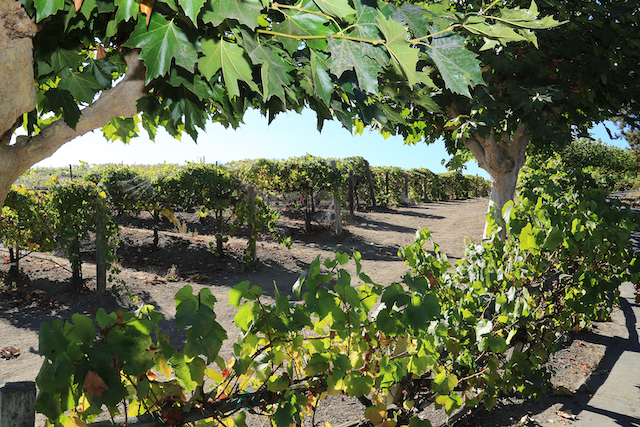What do climate change and cocktails have in common?
Both are changing the wine industry.
Deborah Parker Wong, who helped create Cabrillo College’s new Wine Studies Associates in Science (A.S.) degree, says that the wine industry is at a turning point. Parker Wong, who joined Cabrillo College in 2015 but who has a long history entwined with wine, spends her time delving into the wine industry in one way or another.
From strolling with winemakers in the hills of Tuscany to giving lectures in the countryside of France to doing field research to collect data on the industry’s demographics, Parker Wong is seeing in real-time how the industry is responding to changing demands: both from its consumers and as a result of the natural world.
As part of Cabrillo’s new wine degree, Parker Wong plans on exploring the innovative ways the industry is adapting to engage its new consumer base and also confront the challenging new realities that climate extremes are posing to winemakers.
A Changing—And Aging—Industry
The future of the wine industry lies in the hands of younger women of color.
The industry’s primary market—people in the baby boomer generation—is shrinking, as people are nearing retirement age, the time of life when consumerism typically declines. Meanwhile, millennials and Generation Z, the newest generation to reach drinking age, are more interested in cocktails and spirits than wine.
Parker Wong, during her research into the industry’s consumers, found something surprising.
“All the data lined up and pointed to college-educated young women of color as the wine industry’s customer, and its three to five years customer,” Parker Wong says.
The surprising part lies within the disconnect between its potential consumer base and the industry itself. Less than 1% of wineries in the United States are owned by Black people and just 14% of wineries have a woman as their head winemaker.
But Parker Wong sees the changes in wine consumption as a fascinating part of the industry—one that can represent an opportunity, even if at the same time posing a challenge.
“Some baggage related to wine is that it’s too complicated,” Parker Wong says. “Or that people who sell wine and serve wine are snobby. Wine is not as casual a beverage as other types of beverages like hard seltzers or beer or whatever other choices we have now, and we have lots of choices.”
To stay relevant, Parker Wong says, the wine industry needs to adapt.
“That is what will be taught in this program,” Parker Wong says. “It’s all woven in, and of course, there’s a class coming up in the spring called wine business basics. It takes a really cold hard look at the three tier system of sales that exists in this country.”
A Modern Wine Degree
Staying relevant and finding innovative ways to expand its consumer base is just one aspect of the wine industry that prospective students enrolled in the new degree program can look forward to.
The new degree, which will take effect beginning in the fall of 2024, will have two companion certifications for students seeking employment in the wine industry and also for people looking to pursue interests or increase employment opportunities without earning college credits.
The program has something for a range of people interested in wine, Parker Wong says.
“Analytical wine tasting and the assessment of quality and style in wine are really important to me and I teach that as the foundation of my curriculum,” Parker Wong says. “If you take a wine class with me you will learn wine and spirit education choice, a systematic approach to tasting. Any student who comes out of this program will be skilled at evaluating quality and style in life.”
Parker Wong played a pivotal role in shaping the wine program’s trajectory. The degree and certificates were developed over a three-year period by the instructor along with an industry Advisory Board with people in the industry from across Santa Cruz County.
The program comprises 11 major courses including basic winemaking, wine grape viticulture and world wines. Seven of those courses are transferable to the California State University (CSU) and the University of California (UC) systems.
Overall, this course is for anyone who finds some type of pleasure in the experience of drinking wine—or maybe, someone who wants to.
“Wine is a source of tremendous enjoyment,” Parker Wong says. “There’s the sensory and the experience are part of consuming and drinking wine with friends at the table. It can’t be replicated, in my opinion, by any other beverage in the world.”












